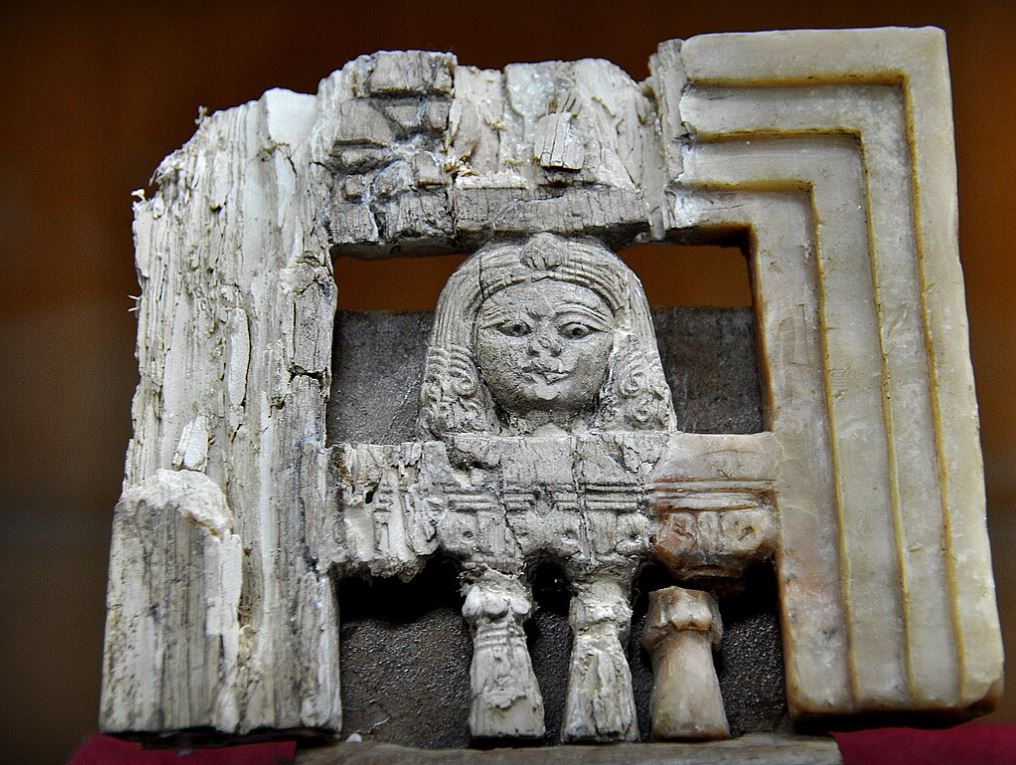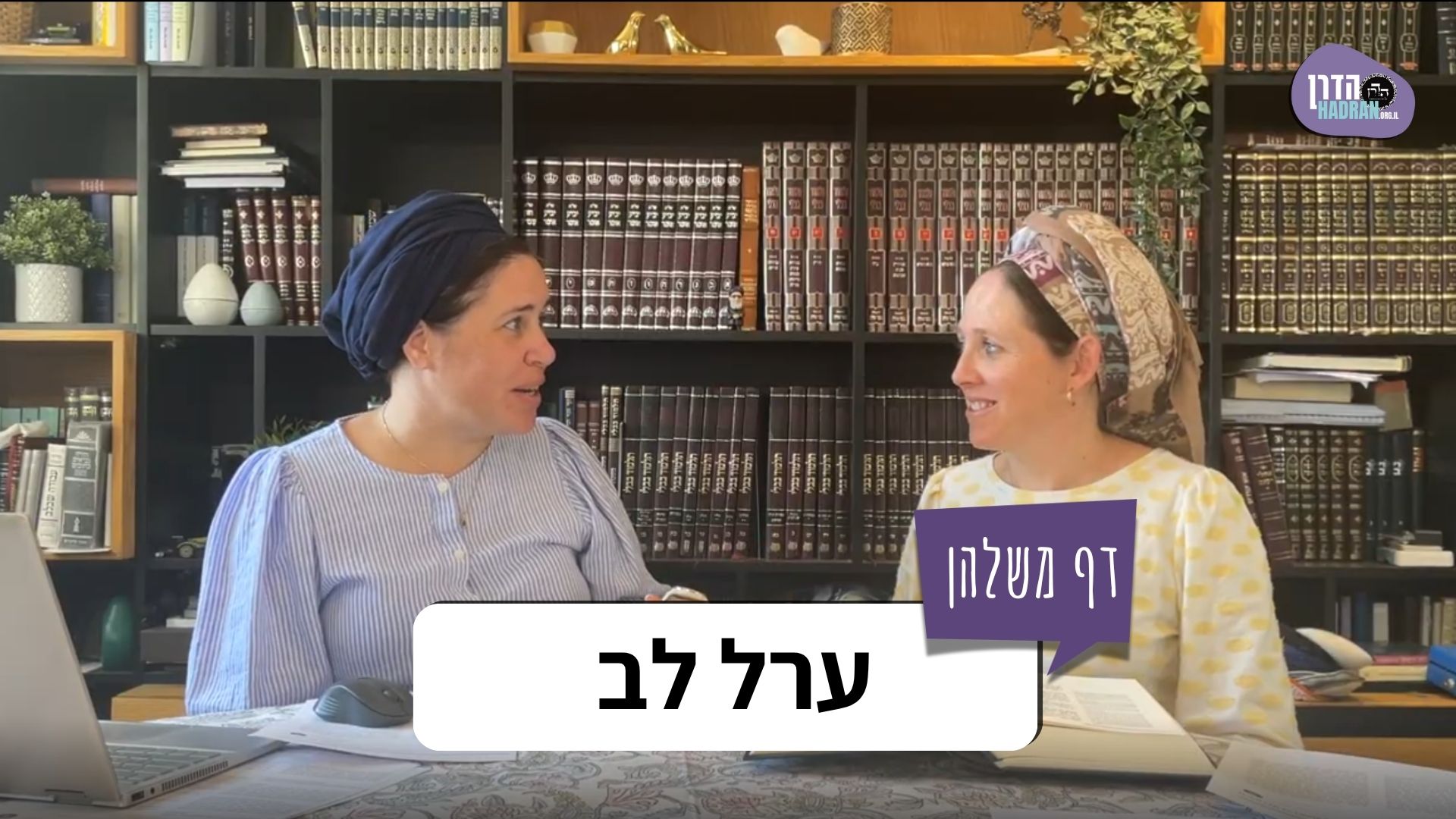In today’s siyum, we discussed asceticism in other cultures and religions as well as Levinas’ approach to Nazirites.
This month’s learning is sponsored by Beth Balkany in honor of their granddaughter, Devorah Chana Serach Eichel. “May she grow up to be a lifelong learner.”
Want to dedicate learning? Get started here:

This month’s learning is sponsored by Beth Balkany in honor of their granddaughter, Devorah Chana Serach Eichel. “May she grow up to be a lifelong learner.”
Delve Deeper
Broaden your understanding of the topics on this daf with classes and podcasts from top women Talmud scholars.
New to Talmud?
Check out our resources designed to help you navigate a page of Talmud – and study at the pace, level and style that fits you.
The Hadran Women’s Tapestry
Meet the diverse women learning Gemara at Hadran and hear their stories.
Nazir 66
אָמַר רָבָא: לָא תֵּימָא סָפֵק חֲזָא סָפֵק לָא חֲזָא. אֶלָּא וַדַּאי חֲזָא, סָפֵק מֵחֲמַת שִׁכְבַת זֶרַע, סָפֵק מֵחֲמַת רְאִיָּיה. כֵּיוָן שֶׁנִּזְקַק לְטוּמְאָה — סְפֵיקוֹ טָמֵא.
Rava said: Do not say that it is uncertain whether he saw a discharge and uncertain whether he did not see one. The uncertainty is not with regard to whether he experienced a discharge at all. Rather, he certainly saw a discharge, but it is uncertain whether the discharge was due to, i.e., defined as, an emission of semen, and it is uncertain whether the discharge was due to the sighting of ziva. In this case, once he has been confirmed as being ritually impure as a zav, his uncertain case is also impure.
שִׁכְבַת זַרְעוֹ טְמֵאָה. לְמַאי? אִילֵימָא לְמַגָּע — מִי גָּרַע מִשִּׁכְבַת זֶרַע דְּטָהוֹר? אֶלָּא זַרְעוֹ שֶׁל זָב מְטַמֵּא בְּמַשָּׂא.
§ The mishna taught that his semen is impure. The Gemara asks: With regard to what halakha is the mishna stating that the semen of a zav is impure? If we say that this is referring to the impurity of contact, i.e., this semen renders one who touches it impure, there is no need to teach this halakha. Is it any worse than the semen of a pure man, which also imparts impurity through contact? Rather, the mishna is teaching that the semen of a zav renders people impure even by carrying, like the impurity of ziva.
מַאן שָׁמְעַתְּ לְהָא דְּאָמַר שִׁכְבַת זֶרַע שֶׁל זָב מְטַמֵּא בְּמַשָּׂא? אִילֵּימָא הַאי תַּנָּא, דְּתַנְיָא, רַבִּי אֱלִיעֶזֶר אוֹמֵר: שִׁכְבַת זַרְעוֹ שֶׁל זָב אֵינוֹ מְטַמֵּא בְּמַשָּׂא, וְרַבִּי יְהוֹשֻׁעַ אוֹמֵר: מְטַמֵּא בְּמַשָּׂא, לְפִי שֶׁאִי אֶפְשָׁר לָהּ בְּלֹא צִיחְצוּחֵי זִיבָה. אֲפִילּוּ רַבִּי יְהוֹשֻׁעַ לָא אָמַר אֶלָּא מִשּׁוּם צִיחְצוּחֵי זִיבָה, אֲבָל בְּעֵינֵיהּ, לָא אָמַר!
The Gemara asks: Who did you hear that said that the semen of a zav renders one impure by carrying? If we say it is this tanna, as it is taught in a baraita that Rabbi Eliezer says: The semen of a zav does not render one impure by carrying, and Rabbi Yehoshua says: It does render one impure by carrying, because it is impossible for his semen to be without droplets of ziva; yet this source is no proof, as even Rabbi Yehoshua said that this semen imparts impurity by carrying only due to the droplets of ziva it contains. However, he did not say that semen in its unadulterated form renders people impure.
אֶלָּא אָמַר רַב אַדָּא בַּר אַהֲבָה: לוֹמַר שֶׁאֵין תּוֹלִין בָּהּ.
Rather, Rav Adda bar Ahava said: The mishna does not mean that the semen of a zav itself renders one impure by carrying. Rather, it comes to say that one does not attribute the ziva to it. Even if the man experienced a discharge within twenty-four hours of his ejaculation of semen, one does not say his discharge was triggered by a general weakening as a result of his seminal emission. Once the man has experienced two discharges of a zav he is an impure zav, and this third discharge is also considered ziva.
סְבַר רַב פָּפָּא קַמֵּיהּ דְּרָבָא לְמֵימַר אַיְּידֵי חוּלְשָׁא הוּא דְּחָזֵי. אָמַר לֵיהּ רָבָא, וְהָתְנַן: גֵּר שֶׁנִּתְגַּיֵּיר מְטַמֵּא מִיָּד בְּזִיבָה! אֲמַר לֵיהּ: אֵין לְךָ חוֹלִי גָּדוֹל מִזֶּה.
When he was before Rava, Rav Pappa thought to say the following explanation for this halakha: Since he sees his discharges out of the weakness brought about from his previous ziva, it can be assumed that any later discharge, even one that follows a seminal emission, is ziva. Rava said to him: But didn’t we learn in a mishna (Zavim 2:3): A convert who has just converted can immediately become impure as a zav. Even if he had a seminal emission as a gentile, subsequently converted, and then experienced the discharge of a zav, one does not associate the discharge of a zav with the earlier emission of semen. Rather, it is treated as the first discharge of a zav. In this case there is no prior weakness of a zav to speak of, and nevertheless the convert is impure as a zav. Rav Pappa said to Rava: There is no greater illness than this. The very acceptance of mitzvot can be considered an illness, as the burden of mitzvot is a weighty matter. For this reason, one does not ascribe a discharge of a zav to the earlier emission of semen.
אֶלָּא, תַּנָּאֵי הִיא. דְּתַנְיָא: שִׁכְבַת זֶרַע שֶׁל זָב מְטַמֵּא בְּמַשָּׂא כׇּל מֵעֵת לְעֵת. וְרַבִּי יוֹסֵי אוֹמֵר: יוֹמוֹ.
The Gemara comments: Rather, the possibility rejected earlier, that the mishna means that semen of a zav imparts impurity by carrying, is a dispute between tanna’im, as it is taught in a baraita: The semen of a zav renders one impure by carrying like the regular discharge of a zav for a twenty-four hour period. In other words, if a zav experienced a seminal emission within twenty-four hours of a ziva, the seminal emission does not impart impurity only through contact in the manner of the semen of a pure individual, but by carrying as well. And Rabbi Yosei says that it imparts impurity by carrying only on its day, i.e., if the seminal emission was before the evening of the day of the ziva. As opposed to Rabbi Eliezer and Rabbi Yehoshua cited earlier, these tanna’im both maintain that the semen of a zav imparts impurity by carrying like ziva does.
בְּמַאי קָמִיפַּלְגִי? בְּדִשְׁמוּאֵל. דִּשְׁמוּאֵל רָמֵי: כְּתִיב: ״כִּי יִהְיֶה בְךָ אִישׁ אֲשֶׁר לֹא יִהְיֶה טָהוֹר מִקְּרֵה לָיְלָה״. וּכְתִיב: ״לִפְנוֹת עֶרֶב יִרְחַץ בַּמָּיִם״.
The Gemara asks: With regard to what do the first tanna and Rabbi Yosei disagree? What is the basis of their dispute? The Gemara answers: They disagree with regard to the following issue discussed by Shmuel, as Shmuel raises a contradiction: It is written: “If there be among you any man who is not pure, by reason of that which chances him by night, then shall he go abroad out of the camp, he shall not come within the camp” (Deuteronomy 23:11). This verse is applied to a zav who experienced a seminal emission. And it is written: “When evening comes on, he shall bathe himself in water, and when the sun is down, he may come within the camp” (Deuteronomy 23:12).
מַאן דְּאָמַר מֵעֵת לְעֵת דָּיֵיק מִ״לִּפְנוֹת עֶרֶב״, וְאִידַּךְ דָּיֵיק ״מִקְּרֵה לָיְלָה״.
The Gemara explains the dispute. The one who says that the semen of a zav imparts impurity by carrying for a twenty-four hour period after experiencing a ziva infers from the phrase “when evening comes on” that the period can involve two evenings, as “comes on” indicates another evening. If so, the semen imparts impurity by carrying for a full twenty-four hour period. And the other Sage, Rabbi Yosei, infers from the expression “by reason of that which chances him by night” that the seminal emission imparts impurity by carrying only until that night, i.e., until the end of the day on which the man experienced the ziva.
וּמַאן דְּאָמַר מִ״לִּפְנוֹת עֶרֶב״, הָכְתִיב ״מִקְּרֵה לָיְלָה״! אָמַר לָךְ, אוֹרְחָא דְקֶרִי לֵמֵתֵיא בְּלֵילְיָא.
The Gemara asks: But according to the one who says that this halakha is derived from “when evening comes on,” isn’t it written: “By reason of that which chances him by night”? The Gemara answers: He could have said to you that this verse affords no proof, as it is referring to the usual case and it is the manner of a seminal emission to occur at night. Consequently, one cannot derive a halakha from this expression.
מַתְנִי׳ נָזִיר הָיָה שְׁמוּאֵל, כְּדִבְרֵי רַבִּי נְהוֹרַאי, שֶׁנֶּאֱמַר ״וּמוֹרָה לֹא יַעֲלֶה עַל רֹאשׁוֹ״. נֶאֱמַר בְּשִׁמְשׁוֹן ״וּמוֹרָה״, וְנֶאֱמַר בִּשְׁמוּאֵל ״וּמוֹרָה״. מָה ״מוֹרָה״ הָאֲמוּרָה בְּשִׁמְשׁוֹן — נָזִיר, אַף ״מוֹרָה״ הָאֲמוּרָה בִּשְׁמוּאֵל — נָזִיר.
MISHNA: The tractate concludes with an aggadic statement about nazirites. Samuel the prophet was a nazirite, in accordance with the statement of Rabbi Nehorai, as it was stated that when Hannah, his mother, prayed for a son, she vowed: “And no mora shall come upon his head” (I Samuel 1:11). How is it derived that mora is an expression of naziriteship? It is stated with regard to Samson: “And no razor [mora] shall come upon his head, for the child shall be a nazirite to God” (Judges 13:5), and it is stated: “And no mora,” with regard to Samuel. Just as the term “mora” that is stated with regard to Samson means that he was a nazirite, so too the term “mora” that is stated with regard to Samuel indicates that he was a nazirite.
אָמַר רַבִּי יוֹסֵי: וַהֲלֹא אֵין מוֹרָה אֶלָּא שֶׁל בָּשָׂר וָדָם! אֲמַר לֵיהּ רַבִּי נְהוֹרַאי: וַהֲלֹא כְּבָר נֶאֱמַר ״וַיֹּאמֶר שְׁמוּאֵל אֵיךְ אֵלֵךְ וְשָׁמַע שָׁאוּל וַהֲרָגָנִי״, שֶׁכְּבָר הָיָה עָלָיו מוֹרָא שֶׁל בָּשָׂר וָדָם.
Rabbi Yosei said: But doesn’t the word “mora” mean nothing other than the fear of flesh and blood? The word should be read as though it were written with an alef, and not a heh, so that it means fear. Rabbi Nehorai said to him: But isn’t it already stated: “And Samuel said: How can I go; if Saul hears it he will kill me” (I Samuel 16:2). This verse indicates that there was fear of flesh and blood upon Samuel. Consequently, the term mora must be understood in accordance with its plain meaning of a razor. If so, Samuel was indeed a nazirite.
גְּמָ׳ אֲמַר לֵיהּ רַב לְחִיָּיא בְּרֵיהּ:
GEMARA: Rav said to his son Ḥiyya:
חֲטוֹף וּבָרֵיךְ. וְכֵן אֲמַר לֵיהּ רַב הוּנָא לְרַבָּה בְּרֵיהּ: חֲטוֹף וּבָרֵיךְ.
Seize the opportunity and quickly recite a blessing over the cup of blessing for the Grace after Meals. And similarly, Rav Huna said to his son, Rabba: Seize the opportunity and recite a blessing.
לְמֵימְרָא דִּמְבָרֵךְ עֲדִיף? וְהָתַנְיָא, רַבִּי יוֹסֵי אוֹמֵר: גָּדוֹל הָעוֹנֶה ״אָמֵן״ יוֹתֵר מִן הַמְבָרֵךְ. וְאָמַר לוֹ רַבִּי נְהוֹרַאי: הַשָּׁמַיִם! כָּךְ הוּא: תֵּדַע שֶׁהֲרֵי גּוּלְיָירִים מִתְגָּרִין בַּמִּלְחָמָה, וְגִבּוֹרִים נוֹצְחִין.
The Gemara asks: Is this to say that one who recites a blessing is preferable to one who answers amen? But isn’t it taught in a baraita that Rabbi Yosei says: The one who answers amen is greater than the one who recites the blessing? And Rabbi Nehorai said to him: By Heavens, it is so. Know that this is true, as the military assistants [gulyarim] descend to the battlefield and initiate the war and the mighty follow them and prevail. The amen that follows a blessing is compared to the mighty who join the war after the assistants, illustrating that answering amen is more significant than reciting the initial blessing.
תַּנָּאֵי הִיא, דְּתַנְיָא: אֶחָד הַמְבָרֵךְ וְאֶחָד הָעוֹנֶה ״אָמֵן״ בַּמַּשְׁמָע, אֶלָּא שֶׁמְּמַהֲרִין לַמְבָרֵךְ תְּחִילָּה.
The Gemara responds: This is a dispute between tanna’im, as it is taught in a baraita: Both the one who recites a blessing and the one who answers amen are included among those who “stand up and bless” (Nehemiah 9:5), but one hurries to first reward the one who recites the blessing. This baraita apparently holds that reciting the blessing is greater than answering amen.
אָמַר רַבִּי אֶלְעָזָר אָמַר רַבִּי חֲנִינָא: תַּלְמִידֵי חֲכָמִים מַרְבִּים שָׁלוֹם בָּעוֹלָם, שֶׁנֶּאֱמַר: ״וְכׇל בָּנַיִךְ לִמּוּדֵי ה׳ וְרַב שְׁלוֹם בָּנָיִךְ״.
Rabbi Elazar said that Rabbi Ḥanina said: Torah scholars increase peace in the world, as it is stated: “And all your children [banayikh] shall be taught of the Lord, and great shall be the peace of your children” (Isaiah 54:13). The Sages interpreted this verse homiletically: Do not read it as: “Your children [banayikh],” but as: Your builders [bonayikh]. Torah scholars are those who build peace for their generation.
הַדְרָן עֲלָךְ הַגּוֹיִם אֵין לָהֶם נְזִירוּת וּסְלִיקָא לַהּ מַסֶּכֶת נָזִיר
































